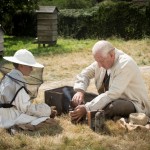Pensioner Joyce Jack loves beekeeping even though she has a potentially deadly allergy – to BEES.
Brave Joyce, 72, risks her life every time she goes near her 12 hives full of 6,000 bees, but is devoted to her craft.
She has cheated death twice after extreme reaction to stings led her to be hospitalised and now carries an emergency adrenalin injector.
But the bee-mad gran, of Peebles in the Scottish Borders, has vowed not to give up on her passion, despite the high risk.
Joyce said: “I’m allergic to bees and people say ‘you are very brave’, but I’m cautious and just manage the situation.
“A sting is very short lived, but the aftermath can be very bad for me. If I got stung by a bee I could have an anaphylactic shock and I could die.
“I’m passionate about bees because we need them in this world and beekeeping is my passion. I’m not going to give up on it.”
When Joyce’s husband, Peter, 73, started beekeeping seven years ago she was “terrified” of the insects, but quickly developed an interest and overcame her fear.
She attended several local meetings, and learned the craft from veteran beekeeper Jim Bogle, who made her a pro in 2009.
Joyce said: “I used to be terrified by bees and then my husband started beekeeping. I was dead against it.
“I was quite frightened of bees, but eventually wanted to learn more about them. I learned that they are little miracle workers and nothing to be afraid of. I went from being frightened to working with them.”
But two years in Joyce got a nasty shock when a bee sting caused her to develop a serious allergic reaction.
She was hospitalised for five days and shocked when doctors revealed that she was allergic to the insects.
She said: “I got quite a bad sting on my wrist while I was doing gardening.
“At that particular point the bees would not leave me alone and they followed me two miles down the road. It wasn’t a pleasant experience.
“Within 24 hours I was in hospital and on a drip. The doctors discovered that I was allergic to bee stings, which was not something I was expecting.
“The second time I was stung on the neck and had to be taken to hospital by ambulance.
“The bee was attracted by the smell of hair lack which I had my hair. It came straight at me and stung me in the neck.”
The allergy causes Joyce’s arms to swell and puts her at risk of going into an anaphylactic shock every time she goes near the insects.
Anaphylaxis is a serious allergic reaction rapid in onset and may cause death, but can be treated with immediate injections of adrenaline or steroids.
Up to two per cent of the world population is estimated to have suffered from the condition at some point in life, and rates appear to be increasing.
But Joyce wears a special beekeeping suit which protects her from the potentially deadly stings.
She said: “I have made up my mind – I’m not going to be controlled by this. I’ve just got to be very careful.
“There are some beekepers who can handle bees with their bare hands, but for me it’s out of the question. I could never, ever do that. It would be just damn right foolish.”
Joyce, who is the Secretary and treasurer of the Newbattle Beekeepers Association, is also involved in the training of new beekeepers at Newbattle Abbey College in Dalkeith.
Together with husband Peter she helps novices get through their beekeeping exams and they look after a working apiary which can host up to 72,000 bees in the summer.
But her allergy has forced her to take a less risky role as secretary and treasurer of the association and she has to carry an adrenalin injector.
Alasdair Joyce, 56, a fellow beekeeper, said: “A significant number of beekeepers do become allergic when they start to keep bees”.
“You can become hypersensitive to bees and in some cases people have to give up keeping them.”




